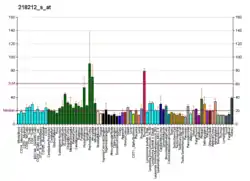MOCS2
Molybdenum cofactor synthesis protein 2A and molybdenum cofactor synthesis protein 2B are a pair of proteins that in humans are encoded from the same MOCS2 gene.[5][6][7] These two proteins dimerize to form molybdopterin synthase.
Function
Eukaryotic molybdoenzymes use a unique molybdenum cofactor (MoCo) consisting of a pterin and the catalytically active metal molybdenum. MoCo is synthesized from cyclic pyranopterin monophosphate (precursor Z) by the heterodimeric enzyme molybdopterin synthase.[7]
Gene
The large and small subunits of molybdopterin synthase are both encoded from the MOCS2 gene by overlapping open reading frames. The proteins were initially thought to be encoded from a bicistronic transcript. They are now thought to be encoded from monocistronic transcripts. Alternatively spliced transcripts have been found for this locus that encode the large and small subunits.[7]
The MOCS2 gene contains 7 exons. Exons 1 to 3 encode MOCS2A (the small subunit), and exons 3 to 7 encode MOCS2B (large subunit).[5]
Genetic disease
Defects in both copies of MOCS2 cause the molybdenum cofactor deficiency disease in babies.[8]
Protein structure
MOCS2A and MOCS2B subunits form dimers in solution. These dimers in turn dimerize to form the tetrameric molybdopterin synthase complex.[9]
References
- GRCh38: Ensembl release 89: ENSG00000164172 - Ensembl, May 2017
- GRCm38: Ensembl release 89: ENSMUSG00000015536 - Ensembl, May 2017
- "Human PubMed Reference:". National Center for Biotechnology Information, U.S. National Library of Medicine.
- "Mouse PubMed Reference:". National Center for Biotechnology Information, U.S. National Library of Medicine.
- Reiss J, Dorche C, Stallmeyer B, Mendel RR, Cohen N, Zabot MT (March 1999). "Human molybdopterin synthase gene: genomic structure and mutations in molybdenum cofactor deficiency type B". American Journal of Human Genetics. 64 (3): 706–11. doi:10.1086/302296. PMC 1377787. PMID 10053004.
- Sloan J, Kinghorn JR, Unkles SE (February 1999). "The two subunits of human molybdopterin synthase: evidence for a bicistronic messenger RNA with overlapping reading frames". Nucleic Acids Research. 27 (3): 854–8. doi:10.1093/nar/27.3.854. PMC 148257. PMID 9889283.
- EntrezGene 4338: MOCS2 molybdenum cofactor synthesis 2
- Ichida K, Aydin HI, Hosoyamada M, et al. (2006). "A Turkish case with molybdenum cofactor deficiency". Nucleosides, Nucleotides & Nucleic Acids. 25 (9–11): 1087–91. doi:10.1080/15257770600894022. PMID 17065069. S2CID 40601679.
- Leimkuhler S, Freuer A, Araujo JA, Rajagopalan KV, Mendel RR (July 2003). "Mechanistic studies of human molybdopterin synthase reaction and characterization of mutants identified in group B patients of molybdenum cofactor deficiency". The Journal of Biological Chemistry. 278 (28): 26127–34. doi:10.1074/jbc.M303092200. PMID 12732628.
Further reading
- Reiss J, Johnson JL (June 2003). "Mutations in the molybdenum cofactor biosynthetic genes MOCS1, MOCS2, and GEPH". Human Mutation. 21 (6): 569–76. doi:10.1002/humu.10223. PMID 12754701. S2CID 41013043.
- Krawczak M, Reiss J, Cooper DN (1992). "The mutational spectrum of single base-pair substitutions in mRNA splice junctions of human genes: causes and consequences". Human Genetics. 90 (1–2): 41–54. doi:10.1007/bf00210743. PMID 1427786. S2CID 12544333.
- Reiss J, Cohen N, Dorche C, et al. (September 1998). "Mutations in a polycistronic nuclear gene associated with molybdenum cofactor deficiency". Nature Genetics. 20 (1): 51–3. doi:10.1038/1706. PMID 9731530. S2CID 23833158.
- Feng G, Tintrup H, Kirsch J, et al. (November 1998). "Dual requirement for gephyrin in glycine receptor clustering and molybdoenzyme activity". Science. 282 (5392): 1321–4. doi:10.1126/science.282.5392.1321. PMID 9812897.
- Stallmeyer B, Drugeon G, Reiss J, Haenni AL, Mendel RR (March 1999). "Human molybdopterin synthase gene: identification of a bicistronic transcript with overlapping reading frames". American Journal of Human Genetics. 64 (3): 698–705. doi:10.1086/302295. PMC 1377786. PMID 10053003.
- Johnson JL, Coyne KE, Rajagopalan KV, et al. (November 2001). "Molybdopterin synthase mutations in a mild case of molybdenum cofactor deficiency". American Journal of Medical Genetics. 104 (2): 169–73. doi:10.1002/1096-8628(20011122)104:2<169::AID-AJMG1603>3.0.CO;2-8. PMID 11746050.
- Strausberg RL, Feingold EA, Grouse LH, et al. (December 2002). "Generation and initial analysis of more than 15,000 full-length human and mouse cDNA sequences". Proceedings of the National Academy of Sciences of the United States of America. 99 (26): 16899–903. doi:10.1073/pnas.242603899. PMC 139241. PMID 12477932.
- Matthies A, Rajagopalan KV, Mendel RR, Leimkühler S (April 2004). "Evidence for the physiological role of a rhodanese-like protein for the biosynthesis of the molybdenum cofactor in humans". Proceedings of the National Academy of Sciences of the United States of America. 101 (16): 5946–51. doi:10.1073/pnas.0308191101. PMC 395903. PMID 15073332.
- Gerhard DS, Wagner L, Feingold EA, et al. (October 2004). "The Status, Quality, and Expansion of the NIH Full-Length cDNA Project: The Mammalian Gene Collection (MGC)". Genome Research. 14 (10B): 2121–7. doi:10.1101/gr.2596504. PMC 528928. PMID 15489334.
- Leimkühler S, Charcosset M, Latour P, et al. (October 2005). "Ten novel mutations in the molybdenum cofactor genes MOCS1 and MOCS2 and in vitro characterization of a MOCS2 mutation that abolishes the binding ability of molybdopterin synthase". Human Genetics. 117 (6): 565–70. doi:10.1007/s00439-005-1341-9. PMID 16021469. S2CID 1267356.
- Hahnewald R, Leimkühler S, Vilaseca A, Acquaviva-Bourdain C, Lenz U, Reiss J (November 2006). "A novel MOCS2 mutation reveals coordinated expression of the small and large subunit of molybdopterin synthase". Molecular Genetics and Metabolism. 89 (3): 210–3. doi:10.1016/j.ymgme.2006.04.008. PMID 16737835.
- Beausoleil SA, Villén J, Gerber SA, Rush J, Gygi SP (October 2006). "A probability-based approach for high-throughput protein phosphorylation analysis and site localization". Nature Biotechnology. 24 (10): 1285–92. doi:10.1038/nbt1240. PMID 16964243. S2CID 14294292.
- Per H, Gümüş H, Ichida K, Cağlayan O, Kumandaş S (July 2007). "Molybdenum cofactor deficiency: clinical features in a Turkish patient". Brain & Development. 29 (6): 365–8. doi:10.1016/j.braindev.2006.10.007. PMID 17158010. S2CID 46531501.




